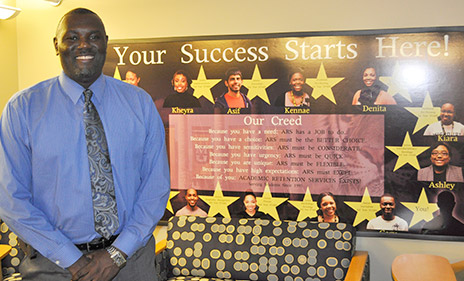Published on Sept. 1, 2015

The first semester of college was a struggle for Donell Young. He had always done well academically, graduating in the top 10 percent of his class at Kansas City Central High School, but as a freshman at UMKC, Young quickly realized college was different.
“I just wasn’t prepared for college,” Young says. “I was being challenged academically like I never had been before and I wasn’t successful.”
What worked for him in high school—studying the night before an exam, then acing it the next day—didn’t work in college.
“It wasn’t for a lack of trying,” he says. “I just didn’t know what to do.”
He sought out resources, but navigating the college campus was not easy and eventually he needed a change of scenery. He earned an associate’s degree from Penn Valley Community College in Kansas City before attending Lincoln University in Jefferson City, Missouri, where he received bachelor’s and master’s degrees in criminal justice and sociology.
While at Lincoln, Young met University President David Henson, who became a mentor.
“He took me under his wing,” Young says. “He started his career in student conduct and he thought I would be good in that area. I don’t know why he planted that seed, but he did. That was powerful to have him believe in me.”
After graduating from Lincoln and spending a year working with at-risk teens at the Fulton (Missouri) Treatment Center, Young returned to Lincoln where he began a career in higher education. Henson hired him to be the university’s first full-time student conduct coordinator and three years later, he was approached about the opportunity to lead MU’s Student Conduct Office. He took that job and was promoted to assistant director of Student Life in 2013.
In July, Young was hired as MU’s Director of Academic Retention Services (ARS), which provides support services and campus resources from the time a student enters MU through graduation.
It is a career path Young had not envisioned; it wasn’t until Henson’s suggestion that Young considered a career in higher education.
“I remember the conversation clear as day,” Young says. “He said ‘I think you would have a successful career in higher education.’ He might not have thought much our brief conversation, but his words of encouragement inspired me to start a career in higher education.”
In his role with ARS, Young hopes to provide assistance to students who find themselves in the same spot Young was in as a college freshman—trying to adjust to college and finding it difficult to navigate the campus.
“The students we serve are me,” Young says. “Some students are just not properly prepared for college and need an opportunity to succeed. I want to share my story so if students are faced with adversity, they don’t just go home. That’s the easy thing to do.”
There are different populations of students served by ARS.
“They all need different things,” Young says. “We serve students that struggle academically, as well as high-achieving students and all those in between. ARS will identify the individual needs of each student and provide or recommend the right resources.”
Young plans to develop a mentoring program for students by identifying faculty members who are willing to serve as mentors along with employing seniors and juniors to mentor sophomores and freshmen.
“What impacted me the most as a student was having mentors who believed in me,” Young says.
The goal for ARS is to assist the students it serves in hopes of having fewer find themselves in the position Young found himself in when he first stepped foot on a college campus.